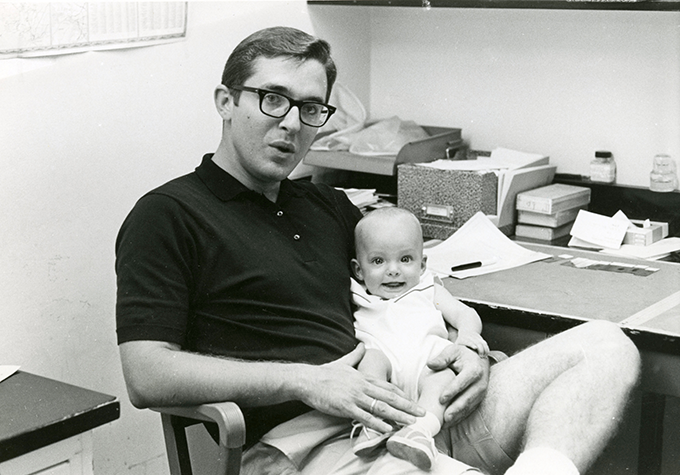$2.1 million fund for bipolar disorder research inspires hope for families

Dr. Leonard holds Trey in his office in 1968, the year when he was a pathology resident at UT Southwestern.
By Sharon Reynolds
The life of Trey Leonard III was filled with moments of great joy – but also extended periods of heartache. He lived with bipolar disorder, a serious mental illness that caused dramatic shifts in his mood and energy and affected his ability to live an independent life. He passed away in December 2016 at the age of 49 from acute pancreatitis, a known complication of one of his bipolar medications.
He will be remembered through the John Sloan (Trey) Leonard III Fund for Bipolar Disorder Research, recently established at UT Southwestern Medical Center through a lead gift from Beverly and Don Freeman, as well as gifts from the Hawn Foundation and Susan and Reid Wittliff.
As longtime friends of the Leonard family, the Freemans and Sarah and Jody Hawn witnessed the intense emotional burden that Trey’s illness placed on his parents, Mary Lois and Dr. Sloan Leonard, and his sister, Susan Wittliff. Because very little is known about the causes of bipolar disorder, the families hope this Fund will lead to the development of more effective treatments.
“The Freemans, Hawns, and Leonards have created a fund that will significantly enhance the efforts of physicians and scientists at UT Southwestern to understand the underlying causes of bipolar disorder and to find more effective treatment and approaches to prevention,” said Dr. Daniel K. Podolsky, President of UT Southwestern. “They care deeply about helping other patients and families as they cope with the challenges of this disease that so profoundly disrupts the lives of those affected and their families. We’re extremely grateful for their generosity.”
For Trey, the first 18 years of life were happy and carefree. He was a bright and adventuresome child who excelled in school. He was named a National Merit Scholarship Finalist during his senior year of high school and displayed natural athletic talent in tennis and soccer. When Trey left for college, everyone saw great promise of a bright future. But soon, his life took a dark and unfortunate turn. He began skipping classes, drinking too much, and often acting out of control.

Trey is pictured with his sister, Susan, shortly before his high school graduation in 1985.
“Within two months when we visited during Parents Weekend, Trey was profoundly depressed,” said Dr. Leonard. “The school psychiatrist told us it was separation anxiety and that they see it all the time. We thought he’d be fine after he got a taste of home at Thanksgiving, but once he came home, he never returned to school.”
Trey experienced a rapid onset of severe bipolar symptoms and became one of almost 5.7 million American adults age 18 and older living with the disorder, also called manic depression. Moods can range from extremely elated and energized to very depressed and hopeless. During manic episodes, people may behave impulsively, make reckless decisions, and take unusual risks. Most of the time, they’re unaware of the negative consequences of their actions and can find themselves in trouble with the law.
“We always lived in fear that Trey would have an accident, and we were even more fearful that he would hurt someone else,” said Mrs. Leonard. “We dreaded phone calls that awakened us during the night.”
The lows of depressive episodes are often so debilitating that people may become obsessed with feelings of loss, personal failure, guilt, or helplessness. Negative thoughts can become so strong that they damage relationships and make it difficult for people to stay in school or keep a job.
In many cases, medications like lithium and other psychotherapeutic treatments are prescribed to help people control their mood swings and other symptoms. Neurostimulation, including electroconvulsive therapy, can also benefit patients for whom medication and therapy haven’t been effective. While UT Southwestern’s Peter O’Donnell Jr. Brain Institute is leading discovery in bipolar disorder, the need for more work in the field remains great. Early recognition and rapid, personalized treatment achieved by means of blood and brain tests will be essential in achieving future goals – through both basic and translational research.
“We cannot find treatments until we figure out the causes,” said Dr. Leonard. “Until then, doctors can only treat symptoms. Basic research will help us get to the root causes. Current medications for the illness are Band-Aids and just treat symptoms. Although physicians do have a variety of medications available, they don’t always know which combinations and dosages work on which people.”
The current trial-and-error approach can leave many patients without lasting solutions. Even while taking medications, mania can occur. Patients often stop taking their medications, and for those with severe cases like Trey’s, the consequences can be devastating.
“We, as parents, always think we can fix things,” said Mrs. Leonard. “Trey’s bipolar disorder was the ultimate thing that we couldn’t fix. We took him to see different mental health professionals and we tried to do everything, but it was out of our control.”
The Leonards have named the Fund as the beneficiary of their charitable remainder trust, a move they hope will one day add significant additional resources to the Fund. The families dream of a future when bipolar disorder is a treatable, curable disease and people living with it can lead happy, fulfilling lives.
“Sarah and I hope that the Hawn Foundation gift is able to help the many people with bipolar disorder who suffer in silence,” said Mr. Hawn, President of the Hawn Foundation. “We want them to realize that they are not alone. This Fund represents our hope that someday they will be able to live in peace.”
Dr. Podolsky holds the Philip O’Bryan Montgomery, Jr., M.D. Distinguished Presidential Chair in Academic Administration, and the Doris and Bryan Wildenthal Distinguished Chair in Medical Science.